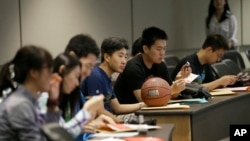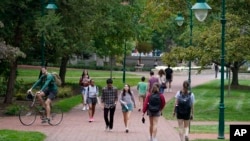In recent weeks, China’s state-owned Global Times newspaper reported several cases involving Chinese students being interrogated and denied entry at the U.S. border.
During a Foreign Ministry press briefing on January 4, China Review News, a Hong Kong-based pro-Chinese Communist Party digital media outlet, asked spokesperson Wang Wenbin about these reports.
The U.S. "has long been wantonly suppressing and ill-treating Chinese students,” Wang answered answered, adding that China views such acts as “selective, discriminatory and politically motivated law enforcement.”
“The U.S. likes to portray itself as open, inclusive, and a place for academic freedom, but it wrongly adopted Proclamation 10043 and put it into force, overstretched the concept of national security, politicized and weaponized academic research and repeatedly interrogated, harassed and deported Chinese students,” Wang said.
That is misleading.
Chinese students remain the largest group of international students on U.S. campuses for the 13th consecutive year.
Only a small number of post-graduate students receive extra scrutiny due to the sensitive subject matter of their studies and possible ties to the military-civil fusion strategy employed by the Chinese Communist Party.
That strategy aims to develop “the most technologically advanced military in the world” by eliminating barriers between the country’s civilian researchers and its military and defense sectors.
What is Proclamation 10043?
On January 4, the Global Times reported two separate cases of Chinese students being detained at the U.S. border and then deported in late 2023.
One involved a Chinese researcher at the U.S. National Institutes of Health’s National Cancer Institute. Global Times said the student was questioned after arriving at Dulles International Airport in Virginia in November 2023 and told that the U.S. State Department had canceled their F-1 student visa. Global Times said a similar incident, involving a Chinese Ph.D. candidate at Yale University, occurred in December.
The two students’ U.S. visas were likely canceled in accordance with Proclamation 10043, a presidential proclamation issued in May 2020 by then U.S. President Donald Trump prohibiting students and researchers with ties to China’s military-fusion strategy from obtaining visas to study at U.S. universities.
Proclamation 10043 says that Beijing uses some Chinese students, mostly post-graduates and post-doctorate researchers, “to operate as non-traditional collectors of intellectual property.”
It states: “Thus, students or researchers from the PRC studying or researching beyond the undergraduate level who are or have been associated with the PLA are at high risk of being exploited or co-opted by the PRC authorities and provide particular cause for concern.”
China has been acquiring key technology through “licit and illicit means,” including “investment in private industries, talent recruitment programs, directing academic and research collaboration to military gain, forced technology transfer, intelligence gathering, and outright theft,” the State Department said.
One recent example of the MFC strategy in action involved Ji Chaoqun, who came to the U.S. on a student visa to study electrical engineering. The U.S. Justice Department said Ji was an agent of China’s Ministry of State Security and that he collected personal data on Chinese-American scientists and engineers to be recruited by China’s spy agency. Ji was tasked with obtaining access to U.S. advanced aerospace and satellite technologies, the Justice Department said. He was sentenced to eight years in prison in January 2023.
Another case involved Ye Yanqing, who received a J-1 exchange visitor visa from the State Department to study at Boston University’s Department of Physics, Chemistry and Biomedical Engineering. She was indicted in January 2020 for visa fraud, making false statements, acting as an agent of a foreign government and conspiracy.
Ye remains in China.
Zheng Zaosong, a J-1 exchange scholar at Boston’s Beth Israel Deaconess Medical Center was indicted in January 2020 after he was caught attempting to smuggle 21 vials of biological research out of the United States aboard a flight destined for China. In January 2021, Zheng was sentenced to time served (approximately 87 days), three years of supervised release, and ordered removed from the United States.
On January 28, 2020, the same day that the indictments of Ye Yanqing and Zheng Zaosong were announced, Charles Lieber, Chair of Harvard University’s Chemistry and Chemical Biology Department, was arrested. In April 2023, Lieber was sentenced by the Boston Federal Court for lying about his affiliation with China’s Thousand Talents Program and the Wuhan University of Technology (WUT), as well as failing to report income he received from WUT.
Unfairly targeting Chinese students?
Under Proclamation 10043, the State Department revoked more than 1,000 visas issued to Chinese nationals as of the fall of 2020.
1,964 visas were denied under the presidential proclamation during fiscal year 2021 – about 2% of the total number of visas issued to Chinese students.
For comparison, that same year, the U.S. issued 90,301 F-1 visas (student visas) and 3,048 J-1 visas (scholar visas) to Chinese students as the COVID-19 pandemic gradually subsided.
In the 2022 fiscal year, the U.S. issued more than 155,000 visas to Chinese students and scholars and 289,526 visas in fiscal 2023. Students from China remain the largest group of international students in the United States for the 13th consecutive year.
While Proclamation 10043 did not result in any significant decline in the number of Chinese students studying in the U.S., critics say it has created a chilling effect among those in China who are now discouraged from applying to U.S. schools.
Think Global, a research and consultancy company, said in a 2022 report that “[i]n the face of this uncomfortable climate, candidates started looking for other alternatives in prestigious European universities or in new ones such as in Qatar or China.”
The National Foundation for American Policy, an Arlington, Virginia-based think tank, wrote in 2021 that Proclamation 10043 is costly to the U.S. in the long run.
It asserted that every 1,000 Ph.D. students blocked from attending U.S. universities cost the American economy an estimated $210 billion in expected value of patents produced at universities over a decade and nearly $1 billion in lost tuition over the same period.







